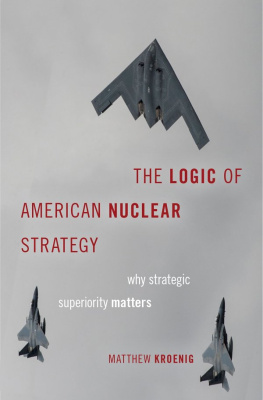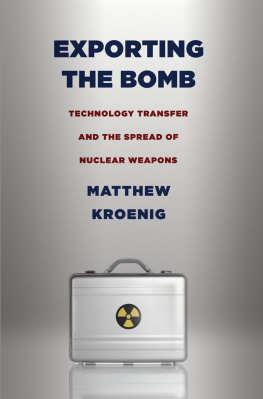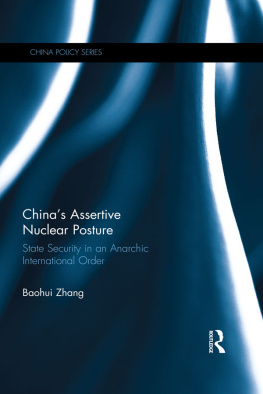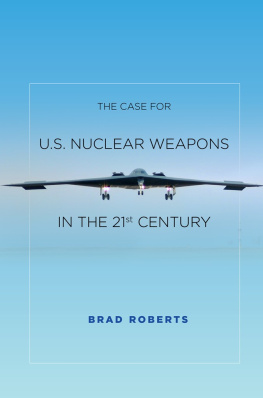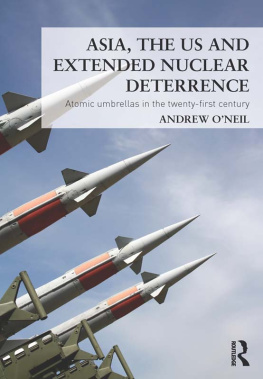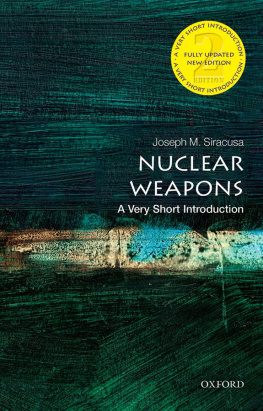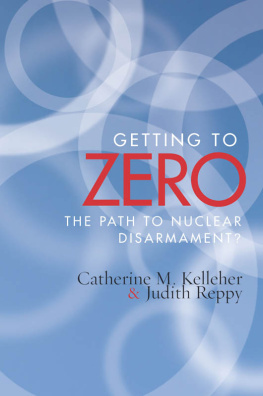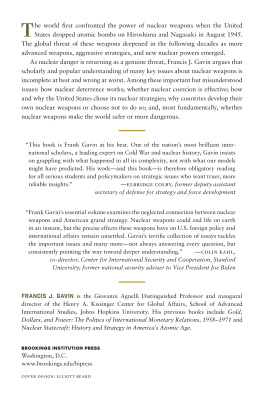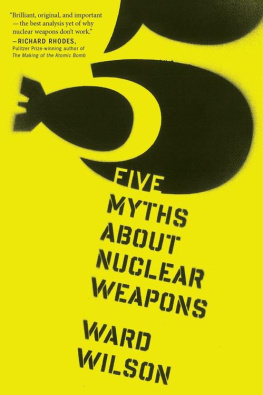The Logic of American Nuclear Strategy
BRIDGING THE GAP
Series Editors
James Goldgeier
Bruce Jentleson
Steven Weber
The Logic of American Nuclear Strategy:
Why Strategic Superiority Matters
Matthew Kroenig

Oxford University Press is a department of the University of Oxford. It furthers the Universitys objective of excellence in research, scholarship, and education by publishing worldwide. Oxford is a registered trade mark of Oxford University Press in the UK and certain other countries.
Published in the United States of America by Oxford University Press
198 Madison Avenue, New York, NY 10016, United States of America.
Oxford University Press 2018
All rights reserved. No part of this publication may be reproduced, stored in a retrieval system, or transmitted, in any form or by any means, without the prior permission in writing of Oxford University Press, or as expressly permitted by law, by license, or under terms agreed with the appropriate reproduction rights organization. Inquiries concerning reproduction outside the scope of the above should be sent to the Rights Department, Oxford University Press, at the address above.
You must not circulate this work in any other form and you must impose this same condition on any acquirer.
Library of Congress Cataloging-in-Publication Data
Names: Kroenig, Matthew, author.
Title: The logic of American nuclear strategy : why strategic superiority matters / Matthew Kroenig.
Description: New York City : Oxford University Press, [2018] | Includes bibliographical references and index.
Identifiers: LCCN 2017035084 (print) | LCCN 2017058642 (ebook) | ISBN 9780190849191 (updf) | ISBN 9780190849207 (epub) | ISBN 9780190849184 (hardcover)
Subjects: LCSH: Nuclear weaponsGovernment policyUnited States. | United StatesMilitary policy. | Strategic forcesUnited States. | Strategy.
Classification: LCC UA23 (ebook) | LCC UA23 .K783 2018 (print) | DDC 355.02/170973dc23 LC record available at https://lccn.loc.gov/2017035084
Also by Matthew Kroenig
Author or Co-Author
A Time to Attack: The Looming Iranian Nuclear Threat
Exporting the Bomb: Technology Transfer and the Spread of Nuclear Weapons
The Handbook of National Legislatures: A Global Survey
Co-Editor
Nonproliferation Policy and Nuclear Posture: Causes and Consequences for the Spread of Nuclear Weapons
Causes and Consequences of Nuclear Weapons Proliferation
CONTENTS
In the fall of 2008, I was settling in to my first semester as an assistant professor in the Department of Government at Georgetown University and teaching a course in my area of expertise, titled Nuclear Weapons in World Politics. Developing a new course is always challenging, and there were many memorable episodes from that first semester, but one in particular stands out.
I was discussing the requirements for successful nuclear deterrence and I explained to my students that once a country possesses a nuclear arsenal capable of a secure, second-strike (the ability to absorb a nuclear attack from an opponent and retain enough surviving warheads to respond with a devastating nuclear counterattack), then nuclear deterrence would hold. I also mentioned that, although academics are skeptical of the idea, many US policymakers believe that the United Statess possession of nuclear superiority over a rival, even above and beyond a mere second-strike capability, also contributes to deterrence.
Inevitably, one of my smart and curious students asked why.
I did not have an answer.
The politics of nuclear weapons was my area of expertise. It was a major part of the reason why I was hired at Georgetown. I had received a Public Policy and Nuclear Threats fellowship from the National Science Foundation during graduate school at the University of California at Berkeley and I had just spent a year as a postdoctoral fellow at the Managing the Atom Project at Harvard University. I had previously served as a military analyst at the Central Intelligence Agency and a strategist in the Office of the Secretary of Defense, where I had worked on issues of nuclear weapons and deterrence. I had a book and several articles on nuclear issues in the pipeline, accepted for publication in top scholarly outlets. I vividly recalled the reams of scholarship I had read on nuclear deterrence theory. Yet, I could not call to mind a single, clear explanation for why a strategic nuclear advantage might translate into a geopolitical advantage. If anyone should have been able to answer this question, it was me. But I was at a loss for words.
I eventually offered something about how a more robust nuclear force might be relevant to counterforce targeting in the event of a nuclear war, but the answer was deeply unsatisfying, even to myself. I was determined to learn more.
This book is the result of that initial curiosity.
The writing of this book was made possible by many institutions and individuals. I am fortunate to teach at Georgetown University and I am grateful to Georgetowns senior leadership, Jack DeGioia, Robert Groves, Joel Hellman, Charles King, and Irfan Nooruddin, for providing me with a career at what I believe is the best institution in the world to be a political science professor. To my fellow international relations scholars at Georgetown, Anthony Arend, Andrew Bennett, Marc Busch, Daniel Byman, Victor Cha, Raj Desai, David Edelstein, Bruce Hoffman, Lise Howard, Robert Lieber, Keir Lieber, Charles Kupchan, Kathleen McNamara, Daniel Nexon, Abraham Newman, Nita Rudra, George Shambaugh, Elizabeth Stanley, Erik Voeten, and James Vreeland, thank you for setting a high bar and inspiring me to do better work every day.
In 2013, I accepted an affiliation as a senior fellow in the Brent Scowcroft Center on International Security at the Atlantic Council. Jon Huntsman, Frederick Kemp, Damon Wilson, Barry Pavel, and Magnus Nordstrom deserve credit for transforming the Atlantic Council from a small organization focusing on transatlantic issues into one of the largest, most diverse, and impactful nonpartisan foreign policy think tanks in Washington in less than a decade.
The book was completed with financial support from the Smith Richardson Foundation. Some of the work on this project was also conducted while I was on a Stanton Nuclear Security Fellowship at the Council on Foreign Relations in Washington, DC. For this opportunity, I am grateful to the Stanton Foundation; the Council on Foreign Relations; the Councils senior leadership, including Richard Haass and James Lindsay; CFR senior fellows Michael Levi and Micah Zenko; and the individuals behind the Councils fellowship programs, Janine Hill and Victoria Alekhine.
I benefited from feedback at a number of seminars where I presented earlier versions of this research. I thank participants at events at the American Political Science Associations 2009 Annual Meeting; The Center for Strategic and International Studies; Georgetown University; The George Washington University; Harvard University; the International Studies Associations 2013 Annual Meeting; Lawrence Livermore National Laboratory; Los Alamos National Laboratory; Michigan State University; Princeton University; the University of Californias Institute on Global Conflict and Cooperation; the University of California at Los Angeles; Wilton Park; US Strategic Command; US Office of the Secretary of Defense; US National Security Council Staff; US Navy submarine bases in Bangor, Washington, and Kings Bay, Georgia; Vanderbilt University; and Yale University.

